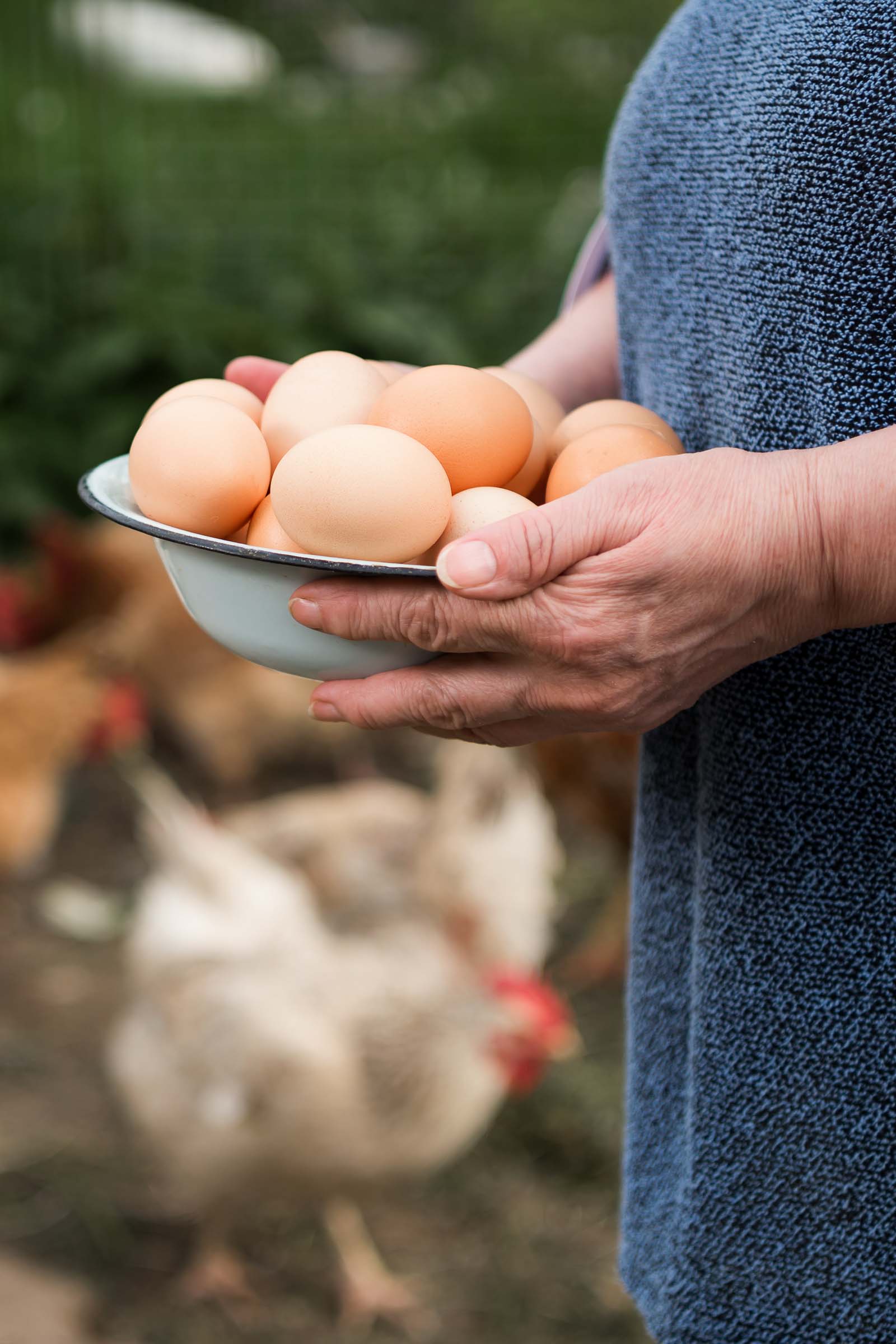We’ve all been there—standing in the egg aisle, staring at rows of cartons, wondering which eggs to choose. From store-bought to fresh, pasteurized to organic, not to mention the various sizes and colors, the choices seem endless. Let’s discover all the egg-citing details and learn how to choose eggs that perfectly suit your needs!

This post may contain affiliate links. As an Amazon Associate, I earn from qualifying purchases. See my Affiliate Disclosure.
Farm Eggs vs Store Eggs: What’s the Difference?
Should you choose eggs fresh from the farm or are store-bought eggs from your neighborhood supermarket just as good or possibly an even better choice? Let’s take a look.
Store-Bought Eggs
Store-bought eggs are widely available, convenient, and usually more budget-friendly. They are also subjected to strict safety standards and regulations, making them a reliably safe choice.
Farm Fresh Eggs
On the flip side, farm eggs are often sourced directly from local farmers or backyard chickens and will give you a more direct connection to where your food comes from. Due to the chicken’s diet, these eggs may have a richer flavor and a brighter yolk, but they may not last as long as store-bought eggs. Farm eggs’ safety regulations might also not be as strict, so it’s crucial to get them from trustworthy suppliers.
You may also be interested in reading my guide on how to preserve farm fresh eggs.

Different Types of Eggs
Whether you buy your eggs at the supermarket or grab them fresh from a nearby farm, you’ve still got more decisions to make. There are different egg classifications, each tied to its unique characteristics. This includes details like where and how the chickens were raised, the type of food they ate, as well as factors like size and color. So, whether you’re browsing the grocery aisle or enjoying a local farm experience, your egg choices are more than meets the eye!
1. Pasteurized Eggs
As you can tell from the name, these eggs go through pasteurization—a process where eggs are heated to a specific temperature to kill bacteria without cooking the egg. This reduces the risk of foodborne illnesses like salmonella, making pasteurized eggs a safer option for dishes that require raw or undercooked eggs. If you prefer to avoid eating raw eggs, you can use pasteurized eggs to make Caesar salad dressing, homemade mayonnaise, or eggnog.
For more information, check out my guide Can You Eat Raw Eggs?
2. Organic Eggs
Organic eggs come from hens raised in an environment that follows strict organic farming standards. These standards include access to the outdoors, organic feed, and a prohibition on antibiotics or synthetic hormones. Due to how much care is put into these hens, organic eggs tend to be pricier than other eggs. But if you prioritize animal welfare, environmental sustainability, and the absence of synthetic chemicals in your food, these are the eggs for you.
3. Soy-Free Eggs
For those with soy allergies or sensitivities, soy-free eggs are a lifesaver. Some commercially produced eggs might have trace amounts of soy in their eggs because the food the hens eat contains soy. To avoid this, look for eggs labeled as soy-free or consult with local farmers about their chicken feed practices.
4. Free-Range Eggs
Free-range eggs come from hens that are not confined to cages and have access to the outdoors. They often have more space to move around, access to sunlight, and a varied diet. The egg color can be either brown or white.
5. Pasture-Raised Eggs
Similar to free-range eggs, pasture-raised eggs come from chickens that have access to pasture land where they can forage for insects and plants. The idea is to mimic the chickens’ natural behavior more closely.
6. Omega-3 Enriched Eggs
These eggs are produced by chickens that are fed a diet rich in omega-3 fatty acids, usually through flaxseed, fish oil, or algae supplements. As a result, the eggs contain higher levels of omega-3s, which are beneficial for heart health.
Different Sizes of Eggs
Eggs come in different sizes—small, medium, large, extra-large, and jumbo. Not only does the size affect its nutritional value, but it also plays a role in how your recipes turn out. For many recipes, the size of your eggs won’t make a huge difference. I recommend using large eggs for just about every recipe as that is a standard size that most cooks use. If a recipe doesn’t specify a size, it’s safe to assume it refers to large eggs.
Baking, on the other hand, is a science that relies on precise measurements. So when you’re baking a cake or cookies, it’s recommended to stick to the size specified in the recipe because the recipe developer tested the recipe with that size egg. Using a larger or smaller egg could affect the structure and texture of your final dish.
Here’s how egg sizes are categorized based on their weight:
- Peewee eggs: Must weigh a minimum of 1.25 ounces, but less than 1.5 ounces each.
- Small eggs: Weigh approximately 1.5 ounces each.
- Medium eggs: Weigh between 1.5 and 1.75 ounces each.
- Large eggs: The most common size, weighing between 1.75 and 2 ounces each.
- Extra-large eggs: Weigh between 2 and 2.25 ounces each.
- Jumbo eggs: Weigh over 2.25 ounces each.

Different Colors of Eggs
Different breeds of chickens lay different colored eggs. Chickens with white feathers and white earlobes typically lay white eggs, while red-feathered chickens with red earlobes will lay brown eggs. There are even some specialty breeds that can lay eggs in unique shades like blue or green, or even with speckled patterns.
The choice between white and brown eggs is a purely aesthetic one as it doesn’t affect the egg’s nutritional quality or flavor. People tend to associate brown eggs with a farm-fresh or organic image, while white eggs are more commonly seen in commercial settings, but there is no nutritional difference between the two, so feel free to choose any color.
When and Where to Use Different Types of Eggs
Which eggs you choose can make a huge impact on the taste, texture, and overall success of a recipe, so understanding when and where to use different types of eggs is key to getting the best results in the kitchen.
1. Baking
Most baking recipes use large eggs as they provide the right balance of moisture and structure. But if a recipe specifies extra-large or jumbo eggs, make sure to tweak the quantity accordingly. If you need to make substitutions, know that a large egg is about ¼ cup and weighs about 2 ounces (this weight is about equally divided between the white and the yolk).
2. Cooking
When it comes to everyday cooking, eggs from the store are convenient and work well in most dishes. But if you’re preparing dishes that involve raw or undercooked eggs, like Caesar salads or pastry cream, consider using pasteurized eggs to minimize the risk of foodborne illnesses.
If you like to eat eggs for breakfast or brunch, read my guide on how to cook the best fried eggs.
3. Specialty Dishes
For specialty dishes, such as poached or fried eggs, consider using farm-fresh eggs from a reliable source to enjoy a richer taste.
4. Bread Making
When you’re making a batch of homemade bread or rolls, consider using extra-large eggs. Their size will add extra moisture to your dough, resulting in a softer and more tender crumb. Plus, most baking recipes specify large eggs.

5. Homemade Desserts
When creating homemade desserts, such as custards, mousses, or soufflés, go for medium- or large-sized eggs. Their well-balanced ratio of yolks to whites will help you achieve your desired texture and consistency.
6. Egg-Based Sauces
For classic egg-based sauces like hollandaise or béarnaise, opt for farm eggs for an intense, rich flavor. The quality of the egg will truly stand out in these nuanced and delicate sauces.
7. Scrambled Eggs and Omelets
When making your morning scramble or brunch omelet, it’s best to reach for some store-bought eggs. Their reliable size and flavor will guarantee a consistent and delicious way to start your day. If you’re a fan of scrambled eggs, read my guide on how to scramble eggs like a pro.
When choosing the right eggs, consider cost, convenience, flavor, safety, and sustainability. Whether you go for fresh, pasteurized, conventionally farmed, or organic eggs, understanding their differences will allow you to make the best decisions based on your preferences and cooking needs.


